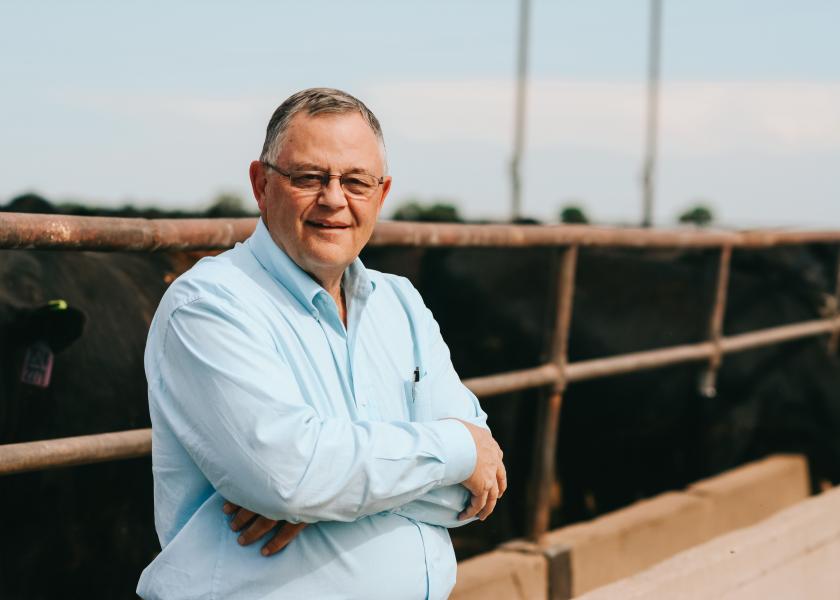Jerry Bohn to Receive FQF Industry Achievement Award

When the opportunity knocked the first time, cattle feeder Jerry Bohn said “no.”
“I turned the Pratt job down once, before we made the decision to come here,” he says. With a young family and a career at CattleFax, “it was a hard move.”
“When I first came, we thought we’d be here five or six years and then go on somewhere else,” he says.
But after 34 years at the helm, it’s hard to separate Jerry Bohn from Pratt Feeders. Both are known for being reliable and consistent.
“You don’t run a business for practice, so obviously making a profit and doing it right was important for us,” he says. “That allowed us to be successful because we did focus on doing things the right way, being honest and having integrity. We did what we said we’d do.”
For his leadership to the beef industry and dedication to raising quality cattle, Bohn will receive the 2019 Feeding Quality Forum (FQF) Industry Achievement Award later this month. The honor will be given at a special dinner during the conference, slated for Aug. 27 to 28 in Amarillo, Texas.
Past recipients selected Bohn for the Certified Angus Beef LLC (CAB)-sponsored award.
“Being recognized by your peers is the ultimate compliment,” he says.
During his tenure at Pratt Feeders, it grew from one yard operating at half capacity to as many as four, with an Oklahoma yard at Buffalo and other Kansas locations at Ashland and Hays (sold in 2014), with close to 120,000-head total capacity.
In 1980, local businessmen purchased the yard, but when Jerry brought his wife Julie and their young family to Pratt a few years later, he took immediate ownership in its success. Since then he’s literally bought into the company, serving on its board now with some second-generation stockholders.
“I don’t miss the day-to-day headaches, the weather and the markets dropping out,” Bohn says. “I do really miss the interaction with the customers.
“It’s a relationship business,” Bohn says. “It takes a pretty big trust for someone to put a load of cattle, that’s worth $40-, $50-, $60,000 on the road, send them to people you might not have met and trust that they’re going to take care of them.”
Bohn’s name was on the line, but everybody from pen rider to trucker to office clerk played a role.
“It takes a team to run an operation like this,” Bohn says.
The company was an early member of U.S. Premium Beef (USPB) and became a partner in the long-running CAB Feedlot Licensing Program in the early 2000s.
“It caused us to do a paradigm shift a little bit, with more focus on quality, and we became more active in looking for ranch cattle, particularly Angus,” Bohn says. “It was something that we needed to do to change our direction.”
The industry is catching up, but Bohn set that in motion at Pratt nearly 20 years ago.
“Over time, working with Jerry personally and with the other managers in the Pratt group I really gained an appreciation for his analytical style and approach to business,” says Paul Dykstra, beef cattle specialist for the brand, remembering many meetings spent poring over data in the Pratt boardroom. “Together we measured the progression of carcass quality in the cattle they were feeding. As the industry embraced carcass quality and what that meant for the economics of cattle marketing, Jerry was on top of that, finding better and better cattle.”
The feeding company implemented individual animal management early on. Pens are still sorted into three or four outcome groups, each one marketed at an optimum finish.
“Today almost everything we sell is based on a grid,” Bohn says. “There’s a risk ratio when you get paid for actually what you have, and sometimes people didn’t really want to find out what they had. More of them are becoming comfortable with that and it’s a way that we can supply more quality to our end user to keep them coming back.”
Doing right for the cattle, the customer and the bottom line—it seems to come natural, but it wasn’t a mapped career path for the farm boy from Wabaunsee County, Kansas. He grew up baling hay, raising pigs, cattle and corn.
That led him to earn an animal science degree from Kansas State University, where he also met Julie. They’ll celebrate 47 years of marriage this fall.
“She’s been so supportive,” Bohn says.
They have three grown children and five grandchildren. He’s a retired lieutenant colonel, after serving for 21 years in the National Guard.
“My goal is to leave a legacy, not only for my family but also with my involvement in the industry,” Bohn says. “You owe it to the industry you’re involved in to work with it and promote it and be involved.”
He’s served as Kansas Livestock Association president and volunteered with the National Cattlemen’s Beef Association, which put him on track to become president there in 2021.
“I hope I’m known as someone who keeps his word and does what I say I’m going to do,” Bohn says.
To register for the Feeding Quality Forum, visit www.FeedingQualityForum.com by Aug. 9. Cost is $200 and covers the two-day educational meeting, including the awards banquet.







